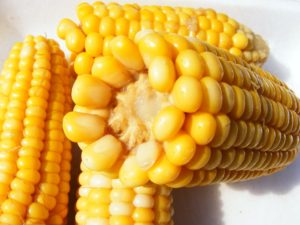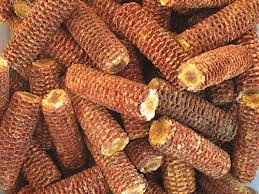Can dogs eat corn? What about corn cobs?

Whether it is bad for dogs to eat corn and corn cobs or not is rich and somewhat controversial.
A lot of people ask and discuss this vital question on forums.
There are tons of articles on this topic on the Internet, which is why we decided to give a full and detailed answer in this post.
Summary
Questions
- Can dogs eat corn?
- Can dogs eat corn cobs?
Answers
- Yes, dogs definitely can eat corn. Common corn-related side effects do exist but are greatly exaggerated. Adequately prepared corn is suitable for dogs and may only benefit your little friend.
- Corn cobs are bad for dogs, and overall, are a big NO for all pets.
However, there is still a big controversy between corn-haters and corn-lovers, and a lot of detail needed to understand the full picture. If you want to know the truth about dogs and corn, you are welcome to read a bit more below.
Is Corn Bad for Dogs?
Why is corn bad for dogs in some cases? This usually depends on the overall quality of food containing corn as an ingredient or a “filler,” as some people call it.
There are several well-known situations when corn might be bad for dogs:
Corn is not Easily Digestible by All Dogs in All Situations
First of all, can dogs digest corn properly in general?
Yes, dogs can digest corn without any problems. Despite many corn-hating articles all over the Internet, there is no straight evidence that processed corn is not digestible for dogs, especially when eaten in small amounts. It is neither toxic nor poisonous.
One more interesting fact is that many dog food brands use corn as one of the ingredients. It is a so-called “filler” mentioned above. Thus, your furry friend may consume some amount of corn regularly even though you do not give it directly.
Cooked corn has even more chances to be adequately digested by your pet than other typical dog food fillers: rice, barley, sorghum, and wheat.
However, it is usually challenging for a dog to digest unrefined corn kernels, and I would recommend avoiding it.
The possible side effects of eating low-quality raw corn are:
- constipation
- diarrhea
- vomiting
- loss of energy and appetite
Bottom line: you need to avoid low-quality food containing unrefined food, and you will have no issues with the digestibility of corn by your dog.
Some Dogs Are Allergic to Corn
This happens. Some dogs, as well as cats and some other animals, are allergic to corn.
However, corn is neither the main reason for dog allergies nor even a common reason for them.
Just 1.5% of confirmed food-related dog allergies are caused by corn. In other words, 98.5% of dogs have no problem with corn in terms of allergic reactions.
Some foods cause many more allergies, e.g., chicken and beef. Is there anybody going to get rid of chicken/beef from their dog’s ration?
Is it still not clear? There are an estimated 9-10 million people in the United States from overall 318 million population with a corn gluten allergy.
Thus, you have a much better chance (3.5% vs. 1.5%) to get allergic by eating corn than your dog. Be safe 🙂
The best way to determine whether your pet is hypersensitive to corn is to consult your vet and do some tests.
Corn as a Filler Can Cause Obesity and High Blood Sugar
Some people firmly believe that corn offers no or very little nutritional value. Is that true?
Actually, to some point, those people are right. Significant amounts of low-quality dog food containing sweet corn as a filler can cause morbid obesity and other issues.
Any low-quality food can cause serious health problems, and if you use dog food appropriately prepared, you can even get some health benefits for your little furry friend.
High-quality dog food uses corn in corn gluten meal which is a very different form from “normal” raw or sweet corn.
I can write another article about the side effects of raw corn, canned corn, and popcorn for dogs.
However, there is a simple rule of thumb: salted and sweet products are usually harmful to dogs because an excessive amount of salt or sugar in food can cause thirst and poisoning.
I hope you will be on the safe side and avoid these dubious types of corn in the diet of your dog.
Is Corn Good for Dogs?
The army of corn-haters is much bigger than the small team of corn-lovers, but I daresay that there are still some powerful reasons to give your dog some amount of corn.
Corn is Not Just a Useless Filler in Dog Food
Corn, like some other fillers, e.g., rice, is a necessary ingredient in dog food because a balanced dog diet should include a full combination of them: carbohydrates, proteins, fats, minerals, vitamins, etc.
The maize in corn gluten meal is a rich source of B-vitamins, fiber, and minerals. It’s also rich in protein and natural antioxidants. However, some have a different opinion.
Why Is Corn Gluten Meal Good for Dogs?
I call it a Big Corn Gluten Myth. People on various forums repeat it like a mantra:
“Corn gluten is bad for dogs. It is, actually, not a gluten. It offers no nutritional value to dogs. You should give your dog some meat instead of this cheap artificial filler”.
Phew.
Corn gluten meal is an excellent protein source and provides several very beneficial nutrients to your dog.
One study investigated the digestibility of corn gluten meals compared to meat meals and concluded the meat meal was slightly better.
Another reliable study investigated dogs and other pets fed either a mixture of corn gluten meal, meat meal and soybean meal or a low-quality chicken meal. The corn gluten meal turned out a better protein source than the meat meal.
Bottom line: the right combination of meat and corn gluten meal works the best. The right amount of corn gluten meal in dog food is healthy and is even very good for your dog.
Unfortunately, I can’t say the same thing about corn cobs. Let’s talk a little bit about this.
Can Dogs Eat Corn Cobs?

Because it resembled a bone, a cob may and will be well accepted by your four-paws pal.
Some dog owners even may use corn cobs as entertainment and a quick snack, which is not a good idea. Let me tell you why.
Can Dogs Eat Corn on the Cob?
Is corn on the cob bad for dogs?
Eating corn cobs is very dangerous for dogs.
A dog can eat kernels from the cob and then chew the cob, thinking of it like a bone. The digestive tract of most (mostly medium and small) dogs and puppies will not cope with such an obstacle. As a result, your friend may end up on a surgery table.
My Dog Ate Corn on the Cob: What Should I Do?
There is advice on what to do if your dog has already eaten corn on the cob:
- Call a vet immediately!
- Watch your dog’s stool and behavior. Having eaten corn cob, a pet may lose its appetite and energy or be in pain. Your detailed description of how the dog has felt for several hours will help a vet define the next steps.
- While waiting for the doctor, make your dog drink a lot of water to soften the cob inside.
Conclusion
The harmful effects of eating corn on your dog are often exaggerated. While well-prepared corn is safe and even suitable for dogs, corn cobs may be fatal, so keep them away from your pet.